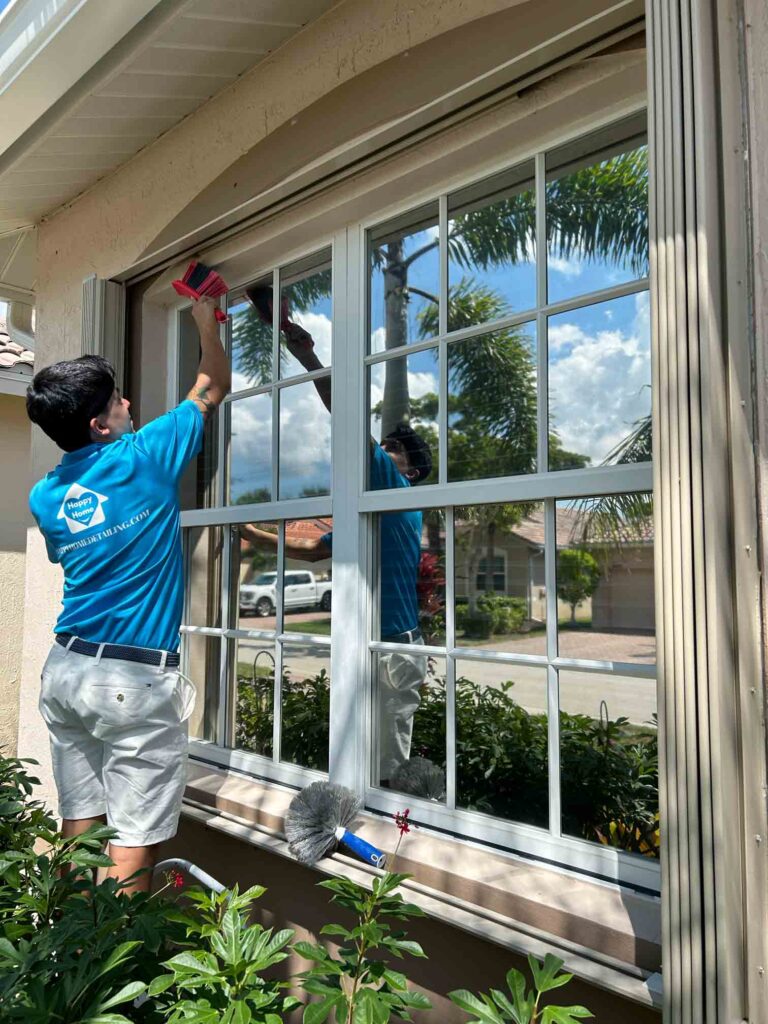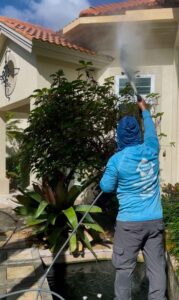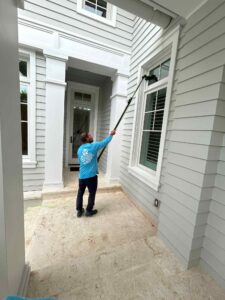Living near the ocean offers breathtaking views, refreshing breezes, and a peaceful ambiance. However, coastal living in Southwest Florida, which includes areas like Naples, Estero, Marco Island, and Bonita Springs, also presents unique challenges, such as the potential for saltwater damage to your home’s exterior. Saltwater, with its corrosive properties, can wreak havoc on your home’s surfaces over time, leading to costly repairs and maintenance. Fortunately, there are preventative measures and cleaning tips you can implement to protect your home and keep it looking its best.
Understanding Saltwater Damage
Saltwater can affect various parts of your home’s exterior, including paint, metal surfaces, wood, and concrete. Here’s how saltwater damage typically manifests:
- Corrosion: Salt accelerates the corrosion of metal surfaces, such as railings, window frames, and hardware. This can lead to rust and structural weaknesses, especially in humid coastal environments like those found in Southwest Florida.
- Paint Damage: Salt particles can cause paint to peel, crack, or fade, reducing your home’s curb appeal and exposing underlying materials to further damage.
- Wood Decay: Saltwater can penetrate wood, leading to warping, swelling, and eventual decay, particularly affecting wooden decks, siding, and outdoor furniture.
- Concrete Erosion: Salt can seep into concrete surfaces, causing them to weaken and crack over time, which is a common issue for driveways and pathways in coastal areas.
To combat these issues, consider the following preventative measures and cleaning tips to protect your home’s exterior from saltwater damage.
Preventative Measures
1. Use High-Quality Paints and Sealants
- Marine-Grade Paint: Invest in marine-grade or high-quality exterior paints designed to withstand harsh coastal conditions. These paints offer better resistance to salt and moisture, preserving the aesthetic appeal of homes in Southwest Florida. Opt for brands specifically formulated to prevent peeling and fading caused by salt exposure.
- Waterproof Sealants: Apply waterproof sealants on wood and concrete surfaces to create a protective barrier against saltwater penetration. Sealants can significantly extend the lifespan of decks, siding, and driveways by preventing water absorption and subsequent damage.
2. Choose Rust-Resistant Materials
- Stainless Steel: Choose stainless steel or galvanized metal for outdoor fixtures and hardware to resist rust and corrosion. Stainless steel is ideal for railings, hinges, and window frames due to its durability and resistance to salt air.
- Aluminum and Vinyl: Consider using aluminum or vinyl siding and trim, as these materials are less susceptible to salt damage. Vinyl siding is particularly popular in Southwest Florida for its low maintenance and long-lasting finish.
3. Regular Maintenance
- Frequent Inspections: Conduct regular inspections of your home’s exterior for signs of saltwater damage, such as rust spots, peeling paint, or wood decay. Early detection allows for timely repairs and prevents further deterioration.
- Timely Repairs: Address any damage promptly to prevent further issues. Repaint, seal, or replace affected areas as needed to maintain the integrity and appearance of your home’s exterior.
4. Landscaping Solutions
- Barrier Plants: Plant salt-tolerant shrubs and trees near your home to act as a natural barrier against salt spray. Native plants are often more resistant to the local climate and require less maintenance.
- Strategic Landscaping: Utilize landscaping features like retaining walls or windbreaks to shield your home from direct exposure to saltwater. These features can help divert salt-laden winds and reduce the impact on your home’s exterior.
Cleaning Tips
1. Regular Rinsing
- Pressure Washing Services: Regularly use professional pressure washing services to rinse your home’s exterior and remove salt deposits. This is especially important for driveways, patios, and home exteriors in Southwest Florida. Pressure washing is a powerful method to eliminate stubborn salt and grime that can lead to damage over time.
- Soft Washing: For delicate surfaces like roofs and siding, opt for soft washing techniques. This low-pressure cleaning method is perfect for removing algae and salt buildup without causing damage, making it ideal for roof washing and exterior house cleaning.
2. Cleaning Metal Surfaces
- Rust Removal: Use a rust remover or a mixture of vinegar and baking soda to clean rusted metal surfaces. Scrub gently with a brush and rinse thoroughly to restore metal fixtures to their original condition. Regular maintenance can prevent rust from spreading and prolong the lifespan of metal components.
- Protective Coatings: After cleaning, apply a protective coating or metal sealant to prevent future corrosion. These coatings act as a barrier against salt and moisture, keeping your metal fixtures looking new and functional.
3. Maintaining Wooden Surfaces
- Wood Cleaner: Use a wood cleaner specifically designed for saltwater exposure to clean and maintain wooden decks, railings, and siding. These products help remove salt deposits and prevent warping and decay.
- Reapply Sealant: Reapply a waterproof sealant annually to protect wood from moisture and salt infiltration. Regular sealing helps maintain the strength and beauty of wood surfaces, making them more resistant to the harsh coastal environment.
4. Caring for Concrete and Stone
- Driveway Cleaning: Regularly schedule driveway cleaning to remove oil stains, dirt, and salt deposits. Maintaining the integrity and appearance of your driveway is essential for preventing long-term damage.
- Salt Stain Removal: Use a mild detergent and water to remove salt stains from concrete and stone surfaces. For stubborn stains, a vinegar solution can be effective. Regular cleaning prevents salt buildup and keeps your driveways and pathways in top condition.
- Sealant Application: Apply a concrete sealant every few years to strengthen and protect against salt erosion. Sealants help maintain the structural integrity of concrete surfaces, preventing cracks and deterioration over time.
Additional Tips
1. Window Care
- Window Cleaning: Regular window cleaning is essential to prevent salt buildup that can cause etching and damage to glass surfaces. Use a gentle cleaning solution and soft cloth to remove salt and grime without scratching. This not only enhances the view but also prolongs the life of your windows.
- Protective Films: Consider applying protective films to windows to reduce salt damage and enhance insulation. These films can also provide UV protection and improve energy efficiency, which is beneficial in sunny Southwest Florida.
2. Roof Maintenance
- Roof Washing: Implement regular roof washing to protect against salt and organic growths, such as algae and moss. These can thrive in humid coastal environments and accelerate roof deterioration. Keeping your roof clean enhances its lifespan and appearance.
- Roof Inspections: Inspect your roof regularly for signs of saltwater damage, such as missing shingles or rusted flashing. Early detection of issues can prevent leaks and more serious damage.
3. Gutter Cleaning
- Regular Gutter Maintenance: Ensure regular gutter cleaning to prevent water damage by ensuring rainwater flows away from your home properly. This reduces the risk of saltwater-related erosion and protects your home’s foundation.
- Gutter Protection Systems: Consider installing gutter guards or protection systems to minimize debris buildup and facilitate easier maintenance.
4. Home Detailing Services
- Comprehensive Home Detailing: Consider professional home detailing services that include a combination of pressure washing, window cleaning, and other specialized services. Tailored cleaning solutions can address every nook and cranny of your home, ensuring comprehensive protection and cleanliness.
- Residential Pressure Washing: Residential pressure washing services are essential for maintaining the beauty and durability of homes, especially in salt-prone areas like Southwest Florida. This service helps remove stubborn dirt and salt buildup from various surfaces, ensuring your home stays in top condition.
Conclusion
Living near the ocean in areas like Naples, Marco Island, Estero, and Bonita Springs offers unparalleled beauty and serenity, but it also requires proactive measures to protect your home from saltwater damage. By using high-quality materials, implementing regular maintenance, and following proper cleaning practices, you can preserve the integrity and appearance of your home’s exterior. These steps will not only extend the lifespan of your home’s materials but also enhance its value and appeal for years to come. Embrace the coastal lifestyle with confidence, knowing your home is well-protected against the elements.




